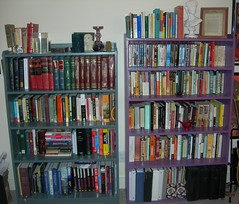326pp
10/06/07 - 10/18/07
This book smells. Not a musty old book-smell. This book had an odor more like a rank cheese, or an active young boy who has not yet acquired proper hygiene habits. The odor summoned memories of certain children's books checked out from the local branch library when I was a kid. To be fair, the scent has diminished substantially since I brought the book home, but it's still there; you don't have to bury your nose between the pages to find it.
I mention the whole odor thing because McSweeney's "Rectangulars" imprint is remarkable, not just for the quality of literature published, but for quality in every aspect of the books they print. I can only surmise that San Francisco was particularly choked by a thick haze of bad incense on the day the galley proofs came to the office.
If I were asked to hold my nose and describe Bowl of Cherries in a single word, I suppose it might be "picaresque." Which adjective is perhaps too-easily overused in summaries and book reviews. This novel's protagonist/narrator, however, is not particularly charming, and though it does move a bit around the map, the action feels lackadaisically tugged from one place to the other, with little urgent purpose dictating the movement.
Judd Breslau, the narrator, is one of these improbably gifted young men of fiction. I was reminded of Hal Incandenza, not just because of his impressive vocabulary, but also because of his brilliance coupled with lack of purpose. When Judd is drummed out of Yale at age fourteen, and is sitting in his graduate advisor's office, I half-expected him to begin screeching.
It's a little curious that Kaufman makes his narrator a teenager, given that Kaufman himself is ninety. Breslau could have been ten years older and still have been a bright and youthful character. I realize that certain themes of wasted potential & the struggle to find purpose are identified with adolescence, but perhaps Mr. Kaufman doesn't realize the extremes to which adolescence has been stretched. I.e., thirty is the new twenty-one, or whatever Parade Magazine and the rest say.
This book is best when at its most bookish. In it's impressive first few pages. Breslau's narration takes us through Mesopotamian history, from the Stone Age to present day in the space of a page or two. Elsewhere he displays a casual familiarity with history & great thinkers, effortlessly expressed with some great words (e.g., "fettle"). I was interested in reading the adventures of this young intellectual. Through most of the book, though, Breslau behaves as a pretty ordinary young man, particularly when driven by a young man's hormones.

It should be obvious by now that I have no problem discussing a book without thoroughly addressing its plot. Likewise, I have no compunction about dropping spoilers, not that this book's flashback-narrative structure leaves much room for "spoliation." I do have one comment to make about Bowl of Cherries' plot: the unexpected reemergence of the narrator's absent father at a novel's end is every bit as ineluctable as the firing of the gun introduced in a play's first act.

